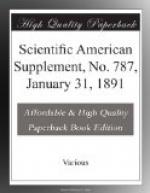we are at Washington; and, except as a directing agent
and a useful servant, I cannot see where the future
growth of the department’s influence is to be
outside of those federal functions which are executive.
Just what that directing influence is to be is the
question of the hour, not only in the broader but
in the special sense. The same question, in a
narrower sense, had arisen in the case of the few
States which employed State entomologists. In
the event, for instance, of an outbreak of some injurious
insect, or in the event of any particular economic
entomological question within the limits of the State
having such an officer, the United States entomologist
would naturally feel that any effort on his part would
be unnecessary, or might even be looked upon as an
interference. He would feel that there was always
danger of mere duplication of observation or experiment,
except where appealed to for aid or co-operation.
This is, perhaps, true only of insects which are local
or sectional, and is rather a narrow view of the matter,
but it is one brought home from experience, and is
certainly to be considered in our future plans.
The favor with which the museum work of the national
division was viewed by you at the meeting last November
and the amount of material sent on for determination
would indicate that the building up of a grand national
reference collection will be most useful to the station
workers. But to do this satisfactorily we need
your co-operation, and I appeal to all entomologists
to aid in this effort by sending duplicates of their
types to Washington, and thus more fully insuring against
ultimate loss thereof.
STATUS OF OUR SOCIETY.
This train of thought brings up the question of the
status of our society with the station entomologists
as represented by the committee of the general association.
Those of us who had desired a national association
for the various purposes for which such associations
are formed, felt, I believe, if I may speak for them,
that the creation of the different experimental stations
rendered such an organization feasible. Your
organization at Toronto and the constitution adopted
and amended at the meeting at Washington all indicate
that the chief object was the advancement of our chosen
work and that the strength of the association would
come from the experiment station entomologists.
There was then no other organization of the kind, nor
any intimation that such a one would be founded.
Some of us therefore were surprised to learn from
the circular sent out by Prof. Forbes, its chairman,
that the committee appointed by the association of
agricultural colleges and experiment stations, and
through which we had hoped to communicate and co-operate
with that association, was not in the proper sense
a committee, but a section which has prepared (and
in fact was required by the executive committee and
the rules of the superior body to prepare) a programme




